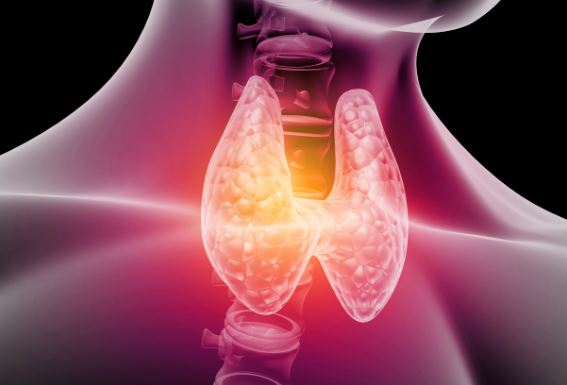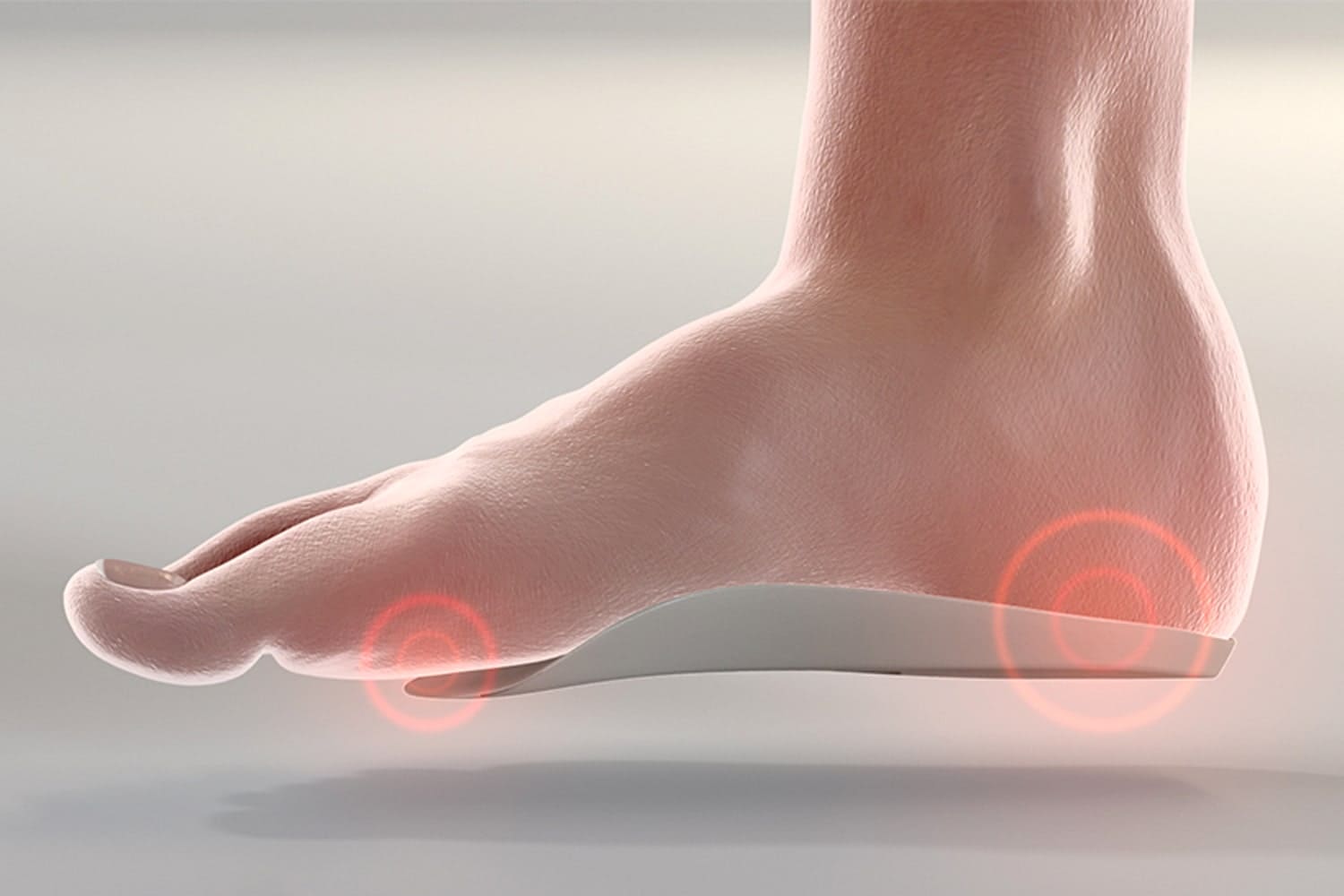Hypothyroidism, a condition characterized by an underactive thyroid gland, can manifest in various symptoms throughout the body, including the feet. Foot issues related to hypothyroidism can range from generalized discomfort to specific conditions such as peripheral neuropathy and fluid retention. Understanding these foot issues and implementing effective management strategies are crucial for improving the quality of life and mobility if you have hypothyroidism.
Contents of This Article:
Hypothyroidism:

Hypothyroidism is a medical condition characterized by an underactive thyroid gland, which means it doesn’t produce enough thyroid hormones to meet the body’s needs. The thyroid gland, located in the front of the neck, produces hormones that regulate metabolism, energy levels, body temperature, and other vital functions.
Common Causes of Hypothyroidism:
- Hashimoto’s thyroiditis: An autoimmune disorder where the body’s immune system attacks the thyroid gland, leading to inflammation and reduced thyroid function.
- Surgical removal of the thyroid gland: Often done to treat thyroid cancer or other thyroid disorders.
- Radiation therapy: Used to treat cancers in the head and neck, which can inadvertently damage the thyroid gland.
- Certain medications: Some drugs, such as lithium or amiodarone, can interfere with thyroid function.
- Congenital hypothyroidism: Present at birth due to improper development of the thyroid gland.
Symptoms of Hypothyroidism:

- Fatigue: Feeling unusually tired, even after getting enough sleep or engaging in minimal physical or mental activity.
- Weight Gain: Unexplained weight gain or difficulty losing weight, despite not changing dietary habits significantly.
- Sensitivity to Cold: Feeling unusually sensitive to cold temperatures, often accompanied by cold extremities (hands and feet).
- Constipation: Difficulty passing stools, often accompanied by abdominal discomfort or bloating.
- Dry Skin: Skin may become dry, rough, and flaky. It may also appear pale or cool to the touch.
- Hair Loss: Thinning hair, particularly on the scalp, and dry, brittle hair that may break easily.
- Muscle Weakness and Aches: Weakness, stiffness, or pain in the muscles, joints, or limbs, sometimes resembling symptoms of fibromyalgia.
- Depression or Mood Changes: Feelings of sadness, depression, or irritability, often accompanied by difficulty concentrating or memory problems.
- Hoarseness: Changes in voice tone or hoarseness, often due to swelling of the vocal cords.
- Menstrual Irregularities: Changes in menstrual cycle patterns, including heavier or irregular periods, or in some cases, cessation of menstruation (amenorrhea).
- Fertility Issues: Hypothyroidism can affect fertility in both men and women, leading to difficulty conceiving or maintaining pregnancy.
- Swelling: Swelling, particularly in the face, hands, feet, or around the eyes, is known as edema.
- High Cholesterol: Elevated levels of cholesterol and triglycerides in the blood, increase the risk of heart disease and atherosclerosis.
- Cognitive Impairment: Difficulty with memory, concentration, and mental clarity, often described as “brain fog.”
- Decreased Heart Rate: A slower-than-usual heart rate, known as bradycardia, which can lead to feelings of dizziness or fainting.
It’s important to note that not everyone with hypothyroidism will experience all of these symptoms, and some individuals may have additional symptoms not listed here. If you suspect you have hypothyroidism based on these symptoms or other factors, it’s crucial to consult with a healthcare professional for proper evaluation and diagnosis.
The Effects of Hypothyroidism on Muscles and Joints:

Hypothyroidism can affect muscles and joints through various mechanisms, including:
- Muscle Weakness:
- Hypothyroidism can lead to decreased metabolism and energy production in cells, which can result in generalized muscle weakness and fatigue.
- This weakness may make it difficult to perform daily activities and can lead to muscle pain or discomfort.
- Fluid Retention:
- Hypothyroidism can cause fluid retention in the body, leading to swelling and inflammation in the joints.
- This can exacerbate symptoms of conditions like arthritis or increase pressure on nerves, leading to joint pain or stiffness.
- Myopathy:
- In some cases, hypothyroidism can lead to a condition known as myopathy, which refers to muscle diseases or disorders.
- Myopathy can cause muscle weakness, pain, and cramping, which may affect mobility and contribute to joint discomfort.
- Nerve Impairment:
- Hypothyroidism can lead to peripheral neuropathy, which affects the nerves outside of the brain and spinal cord.
- Peripheral neuropathy can cause symptoms such as tingling, numbness, weakness, or pain in the muscles and joints of the extremities.
- Metabolic Changes:
- Thyroid hormones play a crucial role in regulating metabolism, which affects various physiological processes, including muscle function and repair.
- Reduced thyroid hormone levels in hypothyroidism can disrupt these processes, leading to muscle wasting, weakness, or impaired healing of muscle injuries.
- Autoimmune Disorders:
- Hypothyroidism, particularly when caused by autoimmune conditions like Hashimoto’s thyroiditis, may be associated with other autoimmune disorders affecting muscles and joints, such as rheumatoid arthritis or lupus.
The effects of hypothyroidism on muscles and joints can vary in severity and presentation among patients. If you’re experiencing muscle weakness, joint pain, or other symptoms suggestive of hypothyroidism, it’s important to consult with a healthcare professional for evaluation and treatment.
Can Hypothyroidism Cause Foot Pain?
Yes, hypothyroidism can potentially cause foot pain, although it’s not one of the most commonly reported symptoms. Hypothyroidism can lead to a condition called peripheral neuropathy, which affects the nerves outside of the brain and spinal cord. Peripheral neuropathy can cause various symptoms, including tingling, numbness, and pain in the extremities, including the feet.
Additionally, hypothyroidism can contribute to other conditions that may cause foot pain indirectly. For example, hypothyroidism can lead to fluid retention and swelling in the feet, known as edema, which can cause discomfort and pain.
Furthermore, hypothyroidism can exacerbate conditions such as plantar fasciitis, where inflammation and pain occur in the thick band of tissue that runs across the bottom of the foot.
Common Foot Issues Associated with Hypothyroidism:
- Peripheral Neuropathy:
- Hypothyroidism can lead to peripheral neuropathy, a condition characterized by damage to the peripheral nerves, particularly in the extremities such as the feet.
- Symptoms may include tingling, numbness, burning sensations, or sharp pains in the feet.
- Hypothyroidism can lead to peripheral neuropathy, a condition characterized by damage to the peripheral nerves, particularly in the extremities such as the feet.
- Edema (Fluid Retention):
- Hypothyroidism can cause fluid retention, leading to swelling and inflammation in the feet.
- Edema can cause discomfort, tightness, and difficulty wearing shoes properly.
- Hypothyroidism can cause fluid retention, leading to swelling and inflammation in the feet.
- Plantar Fasciitis:
- Inflammation of the plantar fascia, the thick band of tissue that supports the arch of the foot, can occur in individuals with hypothyroidism.
- This can lead to heel pain and stiffness, particularly in the morning or after prolonged periods of rest.
- Inflammation of the plantar fascia, the thick band of tissue that supports the arch of the foot, can occur in individuals with hypothyroidism.
- Muscle Weakness and Cramping:
- Generalized muscle weakness and cramping are common symptoms of hypothyroidism, which can affect the muscles in the feet and lead to discomfort or difficulty walking.

Management Strategies for Painful Feet:
Thyroid Hormone Replacement Therapy:
Proper management of hypothyroidism with thyroid hormone replacement therapy is essential to address the underlying cause of foot issues. Working closely with a healthcare provider to optimize thyroid hormone levels can help alleviate symptoms.
Foot Exercises and Stretching:
Gentle exercises and stretching techniques for the feet can help improve flexibility, strengthen muscles, and reduce discomfort. This may include toe curls, calf stretches, and foot rolls with a tennis ball or foam roller.
Footwear Modifications:
Wearing supportive and comfortable footwear can help alleviate foot pain associated with hypothyroidism. Choose shoes/insoles/inserts with adequate arch support, cushioning, and roomy toe boxes to accommodate any swelling or inflammation.
Compression Therapy:
Compression socks or stockings can help reduce swelling and improve circulation in the feet and lower legs. These garments apply gentle pressure to prevent fluid buildup and provide relief from discomfort.
Warm Foot Soaks:
Soaking the feet in warm water can help relax muscles, alleviate pain, and improve circulation. Adding Epsom salts or essential oils to the foot soak may provide additional benefits for relaxation and pain relief.
Healthy Lifestyle Habits:
Maintaining a healthy lifestyle with a balanced diet, regular exercise, and adequate hydration can support overall foot health and minimize symptoms associated with hypothyroidism.
Monitoring for Complications:
It’s important to monitor for any signs of complications such as infections, ulcers, or worsening symptoms. Seek prompt medical attention if you notice any concerning changes in foot health.
To Know More About Foot Management Visit:
Step into Wellness: Discover the Key to Healthy Feet with Daily Care Secrets Unveiled
Foot Massages Miracles: A Comprehensive Guide to Unlock Your Optimal Foot Health and Vitality
Managing Rheumatoid Arthritis in the Foot and Ankle
Choose Arch Support Insoles Here:
Conclusion:
Painful feet due to hypothyroidism can significantly impact daily functioning and quality of life. By understanding the common foot issues associated with hypothyroidism and implementing effective management strategies, you can alleviate discomfort, improve mobility, and enhance overall foot health. Working closely with a healthcare provider to optimize thyroid hormone levels and address underlying causes is essential for the comprehensive management of foot issues related to hypothyroidism.









